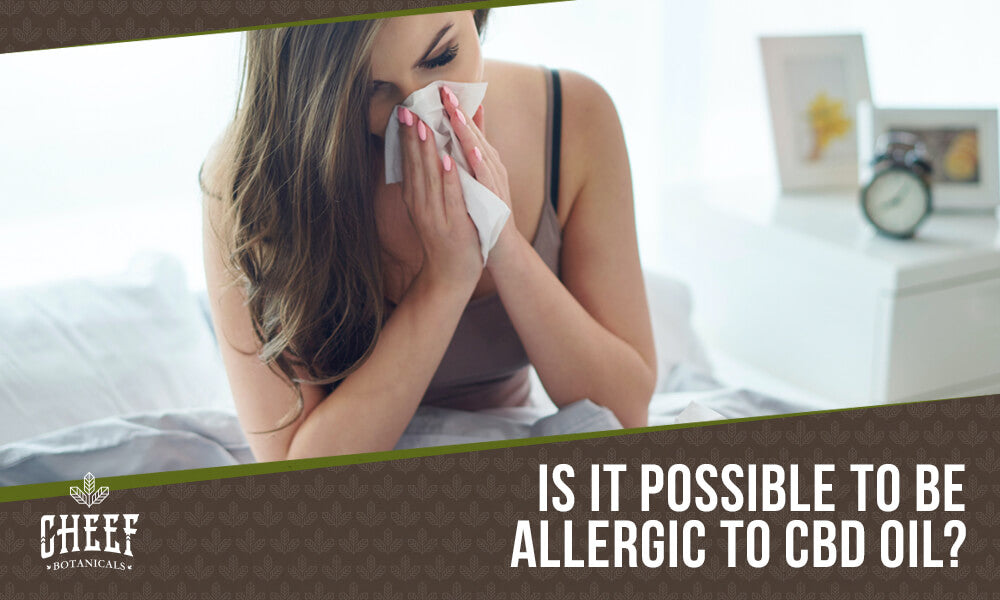From local gas stations to chain grocery stores, CBD oil is filling up shelves. With so many new CBD products to choose from, consumers are beginning to ask the questions that matter. One crucial question is, "can I be allergic to CBD oil?" It is possible to have an allergic reaction to CBD oil. However, it's much more likely you are allergic to a carrier oil included in the product.
CBD is a natural product, so it's unlikely to cause allergies. Still, since it does come from a plant, it can contain pollen particles that stimulate allergies. To fully understand how allergies work in correlation to CBD oil, let's examine both topics.



What's in CBD Oil?
CBD oil is extracted in high concentrations from the cannabis plant using various extraction methods. Manufacturers then blend it with carrier oils, which help dilute the CBD and enhance its absorption, making it easier for the body to consume. Most CBD oils use coconut oil, olive oil, hemp seed oil, or grapeseed oil as the carrier oil. Always read the labels of the CBD products you are buying. Previously, people would think of cannabis and associate it with THC, the psychoactive cannabinoid found in the plant. But when the Farm Bill passed in 2018, that all changed. This new law legalizes hemp, which is cannabis grown with 0.3%THC or less. Essentially, this means that the psychoactive properties have been taken out of the plant. Luckily, the medicinal properties are retained. Not all CBD is created equally; there are three types of CBD products on the market today.
Full Spectrum
Full Spectrum CBD products contain all of the cannabinoids in the cannabis plant. That means trace amounts of THC are in these products. When all cannabinoids in cannabis work together to provide consumers with the maximum benefits, this is called the entourage effect. Full Spectrum products will give consumers the best results.Broad Spectrum
Broad Spectrum products contain all of the cannabinoids in the cannabis plant except for THC. Consumers will still benefit from the entourage effect, although it may be a little less potent. Broad Spectrum CBD is excellent for those looking to avoid THC, such as military members or professional athletes.Isolate
Hemp-based CBD Isolate is the most refined form of the product available for purchase. CBD Isolates are nearly 100% CBD, but make sure you check the label for a full breakdown. There is no entourage effect with CBD Isolates, but consumers will get the purest CBD.Can You Be Allergic to CBD Oil?
Although it is rare, you can be allergic to CBD oil. A misreading in the body causes allergies. When your body makes contact with an allergen for the first time, it incorrectly labels it as a threat to the body. Whenever your body comes into contact with that allergen again, it will try to destroy it. Your immune system's first response is to send histamines, which act like bouncers at a club. Histamines work to remove allergens by any means necessary; they trigger you to sneeze, itch, cough, etc. Allergens are most commonly from foods, pollen, pet dander, and insect stings. Because CBD comes from a plant, it may have traces of pollen that can cause an allergic reaction. Many users claim CBD helps with allergies due to the antihistamine and anti-allergenic properties, but on rare occasions, you may be allergic to the oil itself. It is possible to be allergic to carrier oils as well. It is not uncommon for people to have allergies to coconut or olives, both of which have oils used as carriers. The CBD market is not fully regulated, which means consumers need to read the product labels thoroughly. It also helps to go with a reputable brand. Many users believe they have a CBD allergy when, in reality, they are exhibiting an allergic reaction to another ingredient in the product.
Allergic Reactions to CBD Oil
According to the American Academy of Allergy, Asthma, and Immunology, consumers can develop an allergy to cannabis by inhaling, smoking, touching, and ingesting it. The reactions vary greatly depending on how the allergens entered the body. If a consumer with allergies touches CBD, they may get a rash or hives. Inhalation can result in asthmatic symptoms such as difficulty breathing and wheezing. Anaphylaxis, which can be a fatal reaction, has also been reported in rare cases. In most cases, hemp seed ingestion was the cause of anaphylaxis. Breathing in the allergen can also result in a runny nose, sneezing, itchy face, and facial swelling. Other allergic reactions may include:- Nausea
- Congestion
- Blisters (topical use)
- Inflammation and redness (topical use)
- Sore Throat (Inhalation)
How Are CBD Allergies Diagnosed?
You will need a doctor to diagnose you for CBD allergies accurately. Do not self diagnose, but if you are exhibiting symptoms, please see a doctor. A physician will use either a skin prick test or a blood test. Blood tests are far more accurate. In the skin prick method, also called a puncture or scratch, a doctor will test for allergens by introducing them to the skin. The physician will prick you with a small needle containing the allergens. If there is inflammation or irritation after 10-20 minutes, the patient is likely to be allergic to that substance. In a blood test, doctors look to see if the body has created antibodies for the allergen.



 CBD Gummies - Top Seller
CBD Gummies - Top Seller
 CBD + THC Gummy - Excellent Choice
CBD + THC Gummy - Excellent Choice
 CBD Hemp Flower - Highly Rated
CBD Hemp Flower - Highly Rated
 Full Spectrum CBD Oil - Good Value
Full Spectrum CBD Oil - Good Value



Leave a comment
This site is protected by hCaptcha and the hCaptcha Privacy Policy and Terms of Service apply.